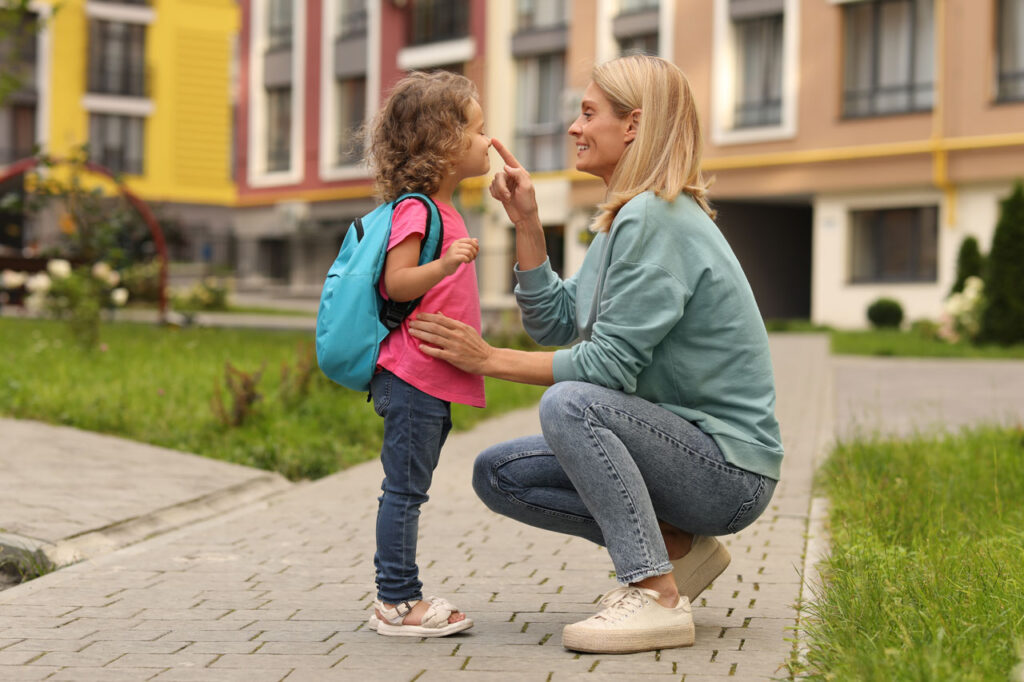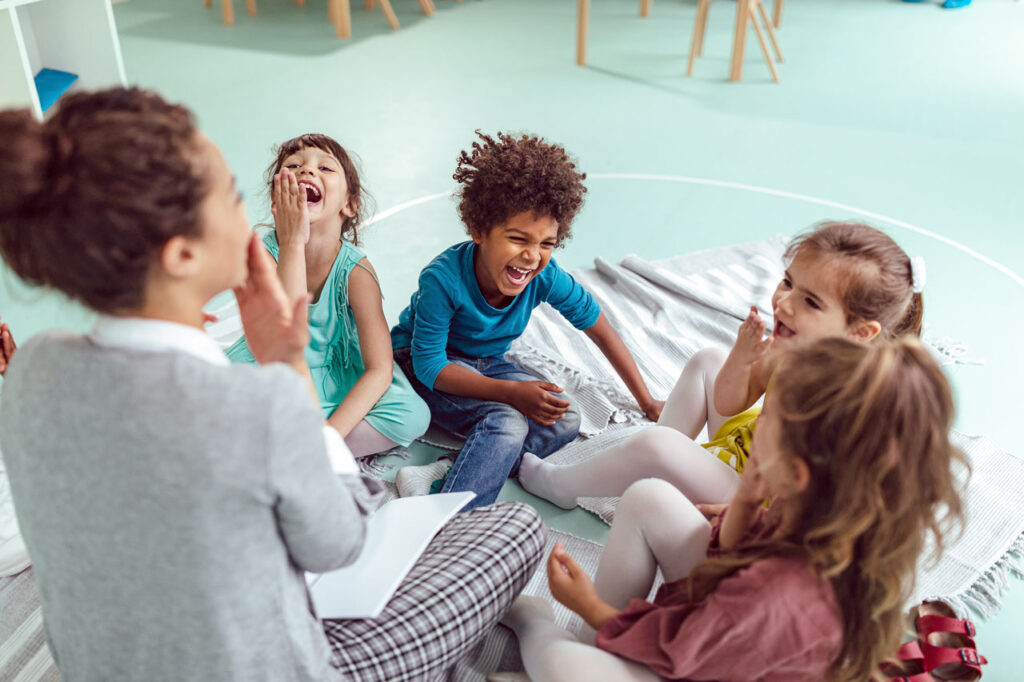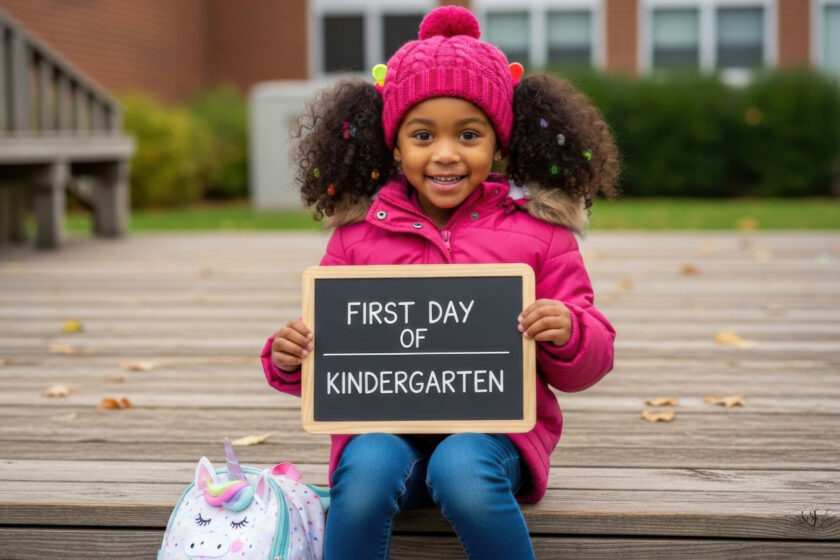As parents and caregivers anxiously prepare for their child’s first experience in kindergarten, it is notable to recognize that this transition is not only important for children, but for parents and caregivers alike. Preparing a child for this exciting milestone can come with its share of challenges and some parents may need more support than others. Early Learning professionals can support parents in many different ways by providing families with resources as soon as possible in preparation for the transition.
While many parents and childcare providers are focused on the basics of letter and number recognition or reading skills, kindergarten readiness is more than isolated skills. Focusing on each child’s unique strengths and their unique abilities will help promote independence, self-help skills, responsibility and build excitement for this long-awaited moment. Helping children build upon their social-emotional capacity will enhance their experiences and potentially minimize the uncertainty of this ‘new beginning’ by teaching them to identify and communicate their feelings.
Classroom quality within a preschool setting and elementary school can be vastly different. A study by the National Institute of Health researched the impacts of Classroom Quality at Pre-Kindergarten and Kindergarten and Children’s Social Skills and Behavior Problems. This study recognized the many changes in a child’s social relationships and day-to-day routines that a typical classroom setting in the United States comes with. The transition to kindergarten introduces children to a more formal setting, new peers, and typically a single teacher instead of two. Adjusting to this environment often demands greater independence, as teachers hold higher expectations for social skills and place more emphasis on academics. This transition is considered a sensitive period during which children are especially influenced by their surroundings, particularly when changing physical locations. A supportive, well-organized pre-K classroom helps prepare children for these challenges, while a high-quality kindergarten environment is critical for sustaining and building their social and behavioral skills. The study showed that children’s first-grade social skills and behavior problems were best predicted by the emotional and organizational quality of their pre-kindergarten classrooms.
Parents and Families

Parents can find comfort knowing that there are a wide variety of resources available to them. To help ease some of the worries and fears that come with this transition, parents can consider these tips:
- Meet the teacher before the first day of school. This will give parents an opportunity to speak to the teacher, get to know them and also share some insights about their child’s preferences, temperament, strengths and weaknesses.
- Set consistent routines before school begins. Establishing morning and evening routines will help the child feel prepared and know what to expect. Change is often scary for children, so the more anticipation a child has of what to expect, the better.
- Find time to read stories, especially books that relate to this new experience so that your child has a better idea of what to expect. Some great books that can help encourage your child are:
- Kissing Hand, Audrey Penn
- The King of Kindergarten, Derrick Barnes and
- Look out Kindergarten, Here I Come, Nancy Carlson
- Mom, It’s My First Day of Kindergarten, Hyewon Yum
- Seven Little Mice Go to School, Kazuo Iwamura
- Miss Bindergarten Gets Ready for Kindergarten, Joseph Slate (Illustrated by Ashley Wolff)
- Pete the Cat: Rocking in My School Shoes, Eric Litwin (Illustrated by James Dean)
- Yoko Learns to Read, Rosemary Wells
- The Invisible String, Patrice Karst
- Network with other parents and build a support system to help you through all the challenges these new experiences can bring.
- Participate in transition activities that help your child assimilate the kindergarten experience. This may include orientation events, family night and school readiness workshops.
- Parents can support children entering kindergarten by providing daily time and space for child-led play, where kids choose what and how to play. Open-ended materials like blocks, art supplies, or dress-up clothes encourage imagination, cooperation, and problem-solving. By following the child’s lead, modeling positive social interactions, and introducing simple games with rules, parents help children practice self-regulation skills like waiting, managing frustration, and taking turns. Reflecting after play through open-ended questions further builds communication and social skills, making play a powerful tool for kindergarten readiness.
Childcare Providers and Teachers

The Preschool or childcare program can also help parents and children through this transition. Some strategies include:
- Promote Kindergarten Readiness Skills
- Focus on social-emotional learning (self-regulation, conflict resolution, teamwork).
- Encourage fine motor skills (using scissors, crayons, writing tools).
- Provide experiences with pre-literacy and early math in playful, engaging ways.
- Create Transition Activities
- Organize visits to local kindergarten classrooms or invite kindergarten teachers to visit the preschool.
- Hold mock “kindergarten days” where children practice lining up, carrying backpacks, and following a schedule.
- Support Families
- Share checklists, resources, and workshops on preparing for kindergarten.
- Provide information about registration, screenings, and school expectations.
- Encourage families to talk about their feelings and questions regarding the transition.
- Build Collaboration with Elementary Schools
- Communicate with local schools about expectations for incoming students.
- Share children’s portfolios, progress reports, or readiness assessments (with family consent) to help schools understand each child’s needs.
- Promote Positive Messaging
- Reassure children that kindergarten is an exciting next step.
- Use books, songs, and discussions about school to normalize the experience.
- Childcare Providers Can Support Play in Preschool
- Design the environment and arrange rooms and centers to invite exploration, creativity, and collaboration.
- Offer open-ended materials that provide blocks, art supplies, and props that spark imagination and problem-solving.
- Extend learning and ask guiding questions, introduce new vocabulary, and connect play to children’s interests.
- Encourage group activities that use projects and games that promote teamwork, turn-taking, and cooperation.
- Support emotional growth to help children practice managing emotions and resolving conflicts during play.
- This structured approach to play helps children build the social, emotional, and problem-solving skills they need for a smooth transition to kindergarten.
During the first week of school parents can show support for their child by engaging in meaningful conversations and asking probing questions about their daily experiences. Celebrating successes and showing pride in their accomplishments can build confidence, in addition to acknowledging their effort. If your child brings home drawings or paintings from school, ask questions related to what they may be doing in the classroom and what kinds of activities they are engaged in during the day. This will not only allow your child to express themselves and build vocabulary skills but will also build self-esteem and reassurance as they navigate this new experience.
The transition to kindergarten is a major milestone for children and their families, and parents and caregivers play a key role in making it successful. During this time, children move into a more structured learning environment with higher expectations for independence, social skills, and academic readiness. They may face new routines, peers, and teachers, which can feel both exciting and overwhelming. Parents and caregivers can support this transition by fostering independence at home, encouraging positive social interactions, building early literacy and numeracy skills, and maintaining consistent routines. Strong communication between families and schools is also essential to ensure children feel secure and supported as they adjust to their new environment. Most importantly, parents should celebrate the joy of having a kindergartener! This exciting milestone is all about discovery, adventure, and new experiences that create lasting memories. It’s a special time to share in your child’s curiosity, strengthen your bond, and build meaningful connections through learning and exploring together. Embracing this journey with enthusiasm not only supports your child’s growth but also makes the experience unforgettable for the whole family!




Comment and make it public on Facebook